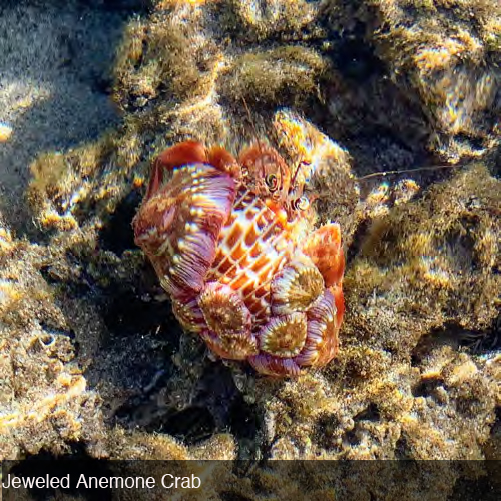Kapo‘o, also known as Sharks Cove, is part of the protected Pupukea Marine Life Conservation District, and is a refuge for fish and other marine
species. It provides critical habitat for a diverse array of marine life including many species of fish, invertebrates, sharks, sea turtles, and the endangered Hawaiian Monk Seal.
Since the marine area was first protected in 1983, visitors increasingly come to swim, snorkel, and dive this spectacular coastline. Visitor numbers
increased by double recently, until the Covid-19 pandemic, which has been devastating for so many, gave our natural ecosystems an unexpected break
from human impacts. In fragile areas like Kapo‘o, thousands of visitors each week can negatively affect the marine environment. Too many people disturb marine life, cause footpath erosion that kills coral, leach toxic sunscreen chemicals into the water, and push fragile reef habitats to the brink of destruction.
With the shutdown and drop in visitors, the marine environment in Hawai‘i, including at Kapo‘o, has seen a noticeable increase in health and abundance – proving that nature is resilient and that human-overuse threatens our nearshore ecosystems.
“In the MLCD, limu is now forming on rocks in the tide pools where they are usually scrubbed away by thousands of feet. These algae are the basis of the food chain in the ocean” said Jenny Yagodich, Director of Educational Programs for Malama Pupukea-Waimea. “Juvenile fish counts in the tide pools have increased. In just one area, the number of juvenile Manini (Convict Tang) increased tenfold from January to May 2020. We’re also seeing new critters coming out of hiding – an indication that people’s presence disturbes the marine life cycle.”
As we move towards reopening our parks and beaches, we can all help our nearshore environment continue to rebound by following pono practices –
good habits that help move toward abundance in this and other marine areas.
Some tips:
• Step only in sandy areas. Submerged rocks are covered in microscopic marine life.
• Keep your distance from marine life. Getting too close changes their behavior. Touching or moving marine life can injure or kill them.
• Only use sunscreens that contain zinc oxide or titanium dioxide. Chemicals like oxybenzone, avobenzone, and octinoxate can cause substantial harm to corals.
• We are grateful to the community members who enjoy marine life responsibly and are leaving a legacy of abundance for our future. Mahalo!
For more information visit www.pupukeawaimea.org (photos: MPW)



